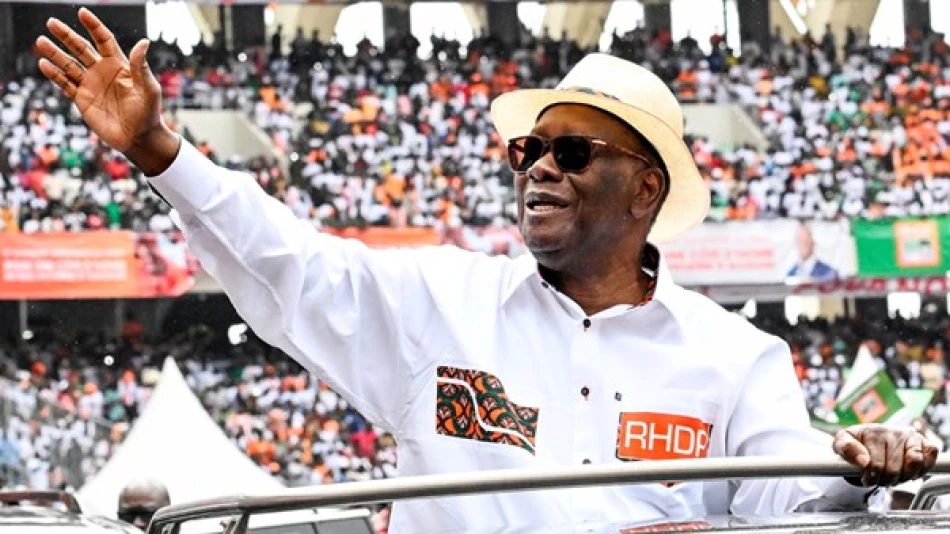
Ivorian President Seeks Fourth Term Amid Political Uncertainty
Ivory Coast's Ouattara Breaks Term Pledge, Seeks Fourth Presidential Term Amid Regional Instability
Ivory Coast President Alassane Ouattara announced Tuesday his intention to run for a fourth term in October's presidential election, reversing his previous promise to step down and citing unprecedented security and economic challenges facing the world's largest cocoa producer. The decision extends the 82-year-old leader's grip on power in a region increasingly plagued by military coups and democratic backsliding.
Breaking the Promise: Political Pragmatism or Power Grab?
In a video message posted on X (formerly Twitter), Ouattara justified his decision by stating that "our country's constitution allows me to serve another term, and my health permits it." The president, who first took office 15 years ago following a disputed election that triggered a brief civil war, had previously pledged not to seek re-election.
"Duty sometimes transcends a promise made in good faith," Ouattara explained, framing his candidacy as a response to "unprecedented security, economic, and financial challenges that require experience to manage."
Constitutional Controversy and Democratic Precedent
Ouattara's announcement echoes a familiar pattern across West Africa, where aging leaders have increasingly manipulated constitutional provisions to extend their rule. His decision to run for a controversial third term in 2020 sparked violent protests that killed dozens, though he ultimately won with 94% of the vote after opposition parties boycotted the election.
The constitutional argument hinges on a 2016 charter that reset term limits, allowing Ouattara to claim his previous terms don't count against the two-term limit. This legal interpretation remains contested by opposition groups and civil society organizations.
Regional Security Crisis Shapes Political Calculations
Ouattara's emphasis on security challenges reflects the deteriorating situation across the Sahel region. Burkina Faso and Mali, Ivory Coast's northern neighbors, have experienced multiple military coups since 2020, while jihadist groups have expanded their operations southward toward the Gulf of Guinea.
The president's experience managing the 2010-2011 post-election crisis, when he relied on French and UN forces to remove predecessor Laurent Gbagbo, may resonate with voters concerned about regional instability. However, critics argue that prolonged rule by aging leaders often contributes to the very instability they claim to prevent.
Economic Stakes in the Cocoa Capital
Ivory Coast's role as the world's top cocoa producer adds international dimensions to Ouattara's decision. The country supplies roughly 40% of global cocoa, making political stability crucial for chocolate manufacturers and commodity markets worldwide. Recent cocoa price volatility, driven partly by climate challenges and regional instability, has increased pressure on the government to maintain continuity.
Under Ouattara's leadership, Ivory Coast has maintained relatively strong economic growth, averaging around 7% annually before the COVID-19 pandemic. His background as a former International Monetary Fund official has helped maintain investor confidence, though critics point to persistent poverty and youth unemployment.
Opposition Response and Electoral Outlook
The announcement sets up another potentially contentious election in a country still scarred by past political violence. Opposition parties, which have struggled to present a unified front against Ouattara's ruling coalition, now face the challenge of mobilizing against a president who has consolidated significant institutional advantages.
The October 25, 2025 election date provides nearly a year for political maneuvering, but also raises questions about whether opposition groups will participate or repeat their 2020 boycott strategy. International observers will likely scrutinize the electoral process closely, given the region's democratic regression.
Implications for West African Democracy
Ouattara's decision reinforces troubling trends across francophone West Africa, where democratic norms have weakened significantly since 2020. Unlike the military coups in neighboring countries, Ivory Coast's democratic erosion follows a more legalistic path, using constitutional interpretation rather than outright force.
This approach may prove more durable but equally damaging to democratic institutions. For international partners, including France, the United States, and European Union, Ouattara's candidacy presents a dilemma between supporting stability and defending democratic principles in an increasingly volatile region.
Most Viewed News

 Layla Al Mansoori
Layla Al Mansoori






